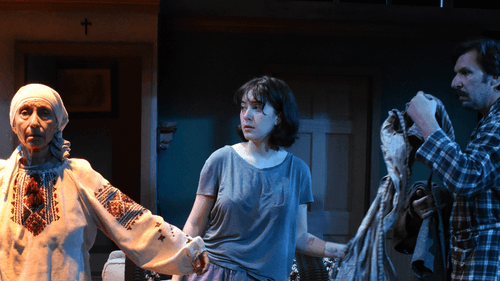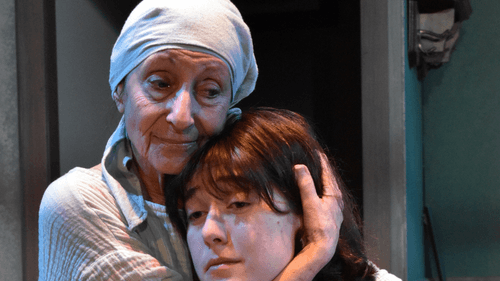Stay in the Loop
BSR publishes on a weekly schedule, with an email newsletter every Wednesday and Thursday morning. There’s no paywall, and subscribing is always free.
Why does culturally specific play development matter?
I’m a Jewish dramaturg, and The Last Yiddish Speaker taught me a lot about the spaces we need to develop Jewish plays.

My favorite definition of dramaturg, my elevator pitch to the uninitiated, is this: I’m a midwife for new plays. I’m a thought partner to playwrights, helping them find the most essential version of their play and then shaping it so their vision is communicated to audiences. Now, the world premiere of Deborah Zoe Laufer’s The Last Yiddish Speaker at InterAct Theatre Company is the perfect chance to dive into this world—particularly as it pertains to Jewish voices.
In the play, which imagines a world where the January 6, 2021, insurrection was successful and the new American regime is hostile to non-white, non-Christian people, Laufer pushes back against an impulse to hide and deny one’s Jewishness, even in the face of deadly consequences. A few years after the insurrection, Sarah and Paul (a father and daughter) flee New York City for a small town upstate, where their whiteness protects them—if no one finds out that they’re Jews. But when an old Jewish woman appears on their doorstep seeking shelter and threatening their cover, Sarah and Paul begin to wonder if eschewing their Jewishness is too high a price for relative safety.
The greatest gift
The Last Yiddish Speaker has quickly garnered attention across the country, but before the current world premiere, it was named a finalist for a competition by the Jewish Plays Project (JPP). Founded and helmed by Philly’s David Winitsky, JPP offers a development platform to contemporary playwrights exploring the Jewish identity and faith. Laufer and five others were selected through a rigorous competition that draws about 300 scripts annually, and I was a participating dramaturg for this cycle.
Before naming the winning play and playwright, JPP offers finalists a day-long workshopping process. The playwrights have a reading of their play over Zoom performed by professional actors, and the remainder of the day is spent in conversation with other professional theater artists, including dramaturgs like me, so they can receive feedback on their play in progress.
But when I first met Laufer one week before the lab in January, I didn't know what our time together was going to offer her. The play was in great shape already—so great that it had been picked up for production at three theaters in 2024 alone. She is a seasoned playwright and was already asking some of the questions and citing opportunities for revision I had identified in my initial read of the play. What could a one-day lab tell her that she didn’t already know?
I underestimated the power of JPP’s greatest gift: being in community with other Jews.
Jewish abundance and authenticity
Jewish voices and perspectives are abundant in the labs that Winitsky and his staff curate. The workshops were developed to honor the multiplicity of Jewish experience and to surround the playwright with as many cultural and artistic experts as possible. For JPP, ethnicity and other markers of racialized identity are not boxes to check or incidental. They are crucial aspects of the artistic process.

Beyond artistic and linguistic knowledge, JPP’s annual competition and labs yield results. When you give playwrights of a marginalized identity the opportunity to celebrate their specific culture and revel in the lived experiences of artists from the same background, you get plays rooted in specificity—specificity audiences currently crave. According to its website, of the 55 plays that JPP has developed, 36 have gone into production.
In the case of The Last Yiddish Speaker, all of us caught onto different themes of the play based on our own individual experiences of growing up as Jewish people in America and thus had different suggestions to offer as Laufer embarked on revisions. And while many play development opportunities bring on dramaturgs to serve as thought partners for playwrights, JPP does something different. They don't hire just one dramaturg—they hire two. In JPP’s model, one dramaturg operates as the theater expert and moderates the day’s conversations with actors and other participants; the other is tasked with speaking specifically to the Jewish aspects of the piece that need a deep level of knowledge—say, if a play has substantial amounts of Yiddish and the playwright isn’t a fluent speaker, for example.
While non-Jewish artists could have contributed to Laufer’s play and her process, it’s not difficult to imagine what could have been missed if JPP hadn’t intentionally built the community they did. That level of authenticity can’t be manufactured.
Concerning urgency
Plays about Jewish culture and written by Jewish people are produced less than people might assume, despite the undeniable presence of Jewish artists in American theater. In my nearly 15 years of working in the field, I have never worked on a production that featured the trifecta: the play is about Jewish people, the playwright is Jewish, and Jewish people make up the majority of the cast and creative team. JPP and other Jewish institutions prioritize Jewish artists and the stories about our ethnic and religious experiences, but I find they also seek to lift up other marginalized experiences as well.

It’s easy to write off Jewish people as a group needing support and protection in the American theater because we’ve had a strong hand in shaping the artistic landscape that endures today. Arthur Miller, Neil Simon, Stephen Sondheim, Wendy Wasserstein … the list of Jewish artists with gargantuan influence and their fair share of the spotlight is long, and their proximity to whiteness played an important role in that prominence. But as Jesse Green in his moving and heartbreaking analysis of the Jewish theater-making in America argues, “The theater, which for many Jews was a major way of becoming American in the first place, seems unable to acknowledge that the danger that American Jews face is not just historical, and not just onstage.”
The relevancy and urgency of The Last Yiddish Speaker concerns me. Why must Jewish people keep dramatizing our past victimization and our still-present proximity to destruction to plead our case for support that never comes, or arrives with conditions? But I remain grateful for Jewish Plays Project and InterAct Theatre Company as a vehicle for self-advocacy. If others won’t speak up for us Jews, we need institutions that empower us to do that for ourselves.
InterAct’s The Last Yiddish Speaker is onstage at the Proscenium Theatre at the Drake from March 29 through April 21, 2024.
At top: Kaitlyn Zion and Gabriel Elmore in InterAct’s The Last Yiddish Speaker. (Photo by Seth Rozin.)
What, When, Where
The Last Yiddish Speaker. By Deborah Zoe Laufer, directed by Seth Rozin. $15-$35. Through April 21, 2024, at the Proscenium Theatre at the Drake, 302 S Hicks Street, Philadelphia. (215) 568-8079 or interacttheatre.org.
Accessibility
The Drake is a wheelchair-accessible venue; accessible seating, including companion and audiovisual seating, is available. Seating requests should be made before showtime by calling the box office at (215) 568-8079 or emailing [email protected]. The venue has gender-neutral restrooms.
Masks are optional.
Sign up for our newsletter
All of the week's new articles, all in one place. Sign up for the free weekly BSR newsletters, and don't miss a conversation.

 Alix Rosenfeld
Alix Rosenfeld